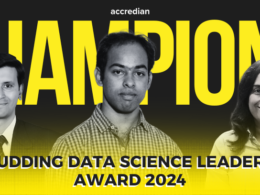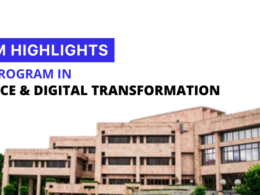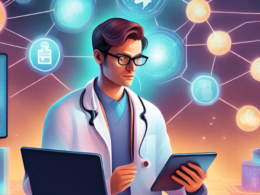Data Science and medicine working together is the ultimate big step for healthcare. Therefore, it makes sense for doctors to adapt some skills and knowledge of data science.
We have entered into the era of big data where we are not only using every spec of data coming from every source but also making smart decisions that speed up business growth.
No matter what industry you’re in, AI and Big Data are all the rage these days, and the need for storing data is more important today than it was yesterday. From the military, schools, government and hospitals, all need some help.
Speaking of hospitals, let’s dive into the emphasis on why healthcare professionals need to learn data science.
It’s said, ‘Health is wealth, with great Health, you can conquer it all!’. The medicine and healthcare industries are considered one of the most crucial, revolutionary and promising industries around.
Slowly though, things are changing from computerised medical records, to drug discovery and genetic disease exploration; one can find data analytics moving the medical science to a whole new level. And the fun has just begun!
Healthcare and data science are often linked together as more and more industries try to reduce their expenses with the help of data. On the regular, the field of data science in medicine is developing on a rapid basis and it’s important they stick together.
Usually, data scientists are the ones who have advanced training in statistics, maths and computer science. Data visualisation, data mining and information management are some of its crucial aspects.
Businesses have already jumped at the opportunity produced by the combination of data science and healthcare. For example, Omada Health developed a program aimed at reducing the risk of preventable health issues.
It takes data from smart devices, like scales and pedometers, to process the patient’s behavioural data and develops a highly customised program based on the results.
Another Example is produced by Enlitic, an organisation that pairs radiologists with data scientists to increase the accuracy and efficiency of diagnostics. Featuring deep learning algorithms, data scientists help analyse data from CT scans, X-rays, etc. so that doctors can ‘diagnose sooner with renowned accuracy’.
Skills needed for career in Data Science, Healthcare
A few skills required to make out a career as a healthcare data scientist include:
- Dimensionality Reduction
- Supervised Machine Learning
- Time Series Analysis
- Natural Language Processing
Furthermore, there are some interesting use cases of data science with the highest impact and the most significant potential for the future in the healthcare realm. Let’s check them out.
1. Medical image analysis
If we take a look at the overall healthcare sector, you will find that it has received a great bunch of benefits from data science application. Several techniques, including magnetic resonance imaging (MRI), X-ray, computed tomography and mammography, are used for better treatment.
Whether it’s about improving the image quality or extracting data from images more efficiently and providing the most accurate interpretation, data science seems to and will continue to, contribute to a great extent.
2. Genetics and Genomics
This feature has enabled an advanced level of treatment personalisation. Basically, professionals need to understand the impact of DNA on our Health and find individual biological connections between genetics, diseases and drug response.
Data science techniques allow for the integration of different kinds of data with genomic data in disease research. This provides a deeper understanding of how different genetic structures will react to particular drugs and diseases.
3. Virtual assistance
Optimisation of the clinical process builds upon the concept that, for many cases, it is not actually necessary for patients to visit doctors in person. The mobile application can give a more effective solution by ‘bringing the doctor to the patient’.
AI-powered mobile apps can provide basic healthcare support, usually as chatbots. All you have to do is describe your symptoms, or ask questions and then receive key information about your medical condition.
Apps can remind you to take your medicine on time and if necessary, assign an appointment with a doctor.
So if you are in the medical/healthcare field and want to change the game enormously, consider exploring data science and upskilling yourself accordingly.





